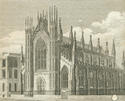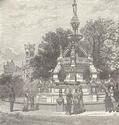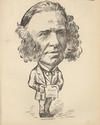Learning and Beliefs
By Peter Hillis
 The city's motto, "Let Glasgow Flourish by the preaching of the Word", suggests that Christianity, with a preference for evangelical Christianity, played an important role in learning and beliefs in the city. Further evidence can be seen in the built environment with the skyline punctuated by church spires and towers, even if by the 1990s some of these buildings were fulfilling a purely secular role, in some cases as bars and nightclubs. This period witnessed a steady rise in the presence of organised religion. The Disruption of 1843 and the founding of the Free Church multiplied the number of churches and individual congregations continued to expand. St Andrew's Roman Catholic Church became a Cathedral, and by the 1880s the Barony Church grew to the largest Presbyterian congregation in the city with a roll of over 2,800 people.
The city's motto, "Let Glasgow Flourish by the preaching of the Word", suggests that Christianity, with a preference for evangelical Christianity, played an important role in learning and beliefs in the city. Further evidence can be seen in the built environment with the skyline punctuated by church spires and towers, even if by the 1990s some of these buildings were fulfilling a purely secular role, in some cases as bars and nightclubs. This period witnessed a steady rise in the presence of organised religion. The Disruption of 1843 and the founding of the Free Church multiplied the number of churches and individual congregations continued to expand. St Andrew's Roman Catholic Church became a Cathedral, and by the 1880s the Barony Church grew to the largest Presbyterian congregation in the city with a roll of over 2,800 people.
Christianity
 Many of the city's most prominent individuals testified to the importance of Christianity in their values and beliefs. Sir Michael Connal, industrialist and philanthropist, saw Christianity governing his motives and actions in which "the Christian in all the duties and opportunities of the situation in which he may be placed is bound to have God's glory constantly in mind." This belief system manifested itself in many ways including the giving of large sums of money to religious causes, a trend which transcended religious denomination with, for example, the pawnbroker Agnes Mullen donating £2,600 to St Andrew's Roman Catholic Cathedral in the late 19th century. It also helps to explain why so many prominent citizens served on a wide range of religious associations. Alexander Allan was co-partner in the Allan Royal Mail Line which later became the Montreal Ocean Steam Company. He was an elder in Wellington Street United Presbyterian Church and served as a trustee for Quarriers Homes, and on the committee of the United Evangelistic Association. The motives behind this philanthropic work were varied, but religious belief formed the central driving force. Nor was it blind acceptance of religious doctrines. Connal's comment on a sermon preached in 1843 by Dr Candish was that it had been "a very powerful sermon, but reprehensible as being speculative in his views about the intermediate state. It was more original than improving." At the other end of the social scale a lapsed churchgoer wrote that "I didnae like it [Sunday School] much. I just tholled [bore] it because I was sent ... but I never took up with the Kirk when I'd just myself to please."
Many of the city's most prominent individuals testified to the importance of Christianity in their values and beliefs. Sir Michael Connal, industrialist and philanthropist, saw Christianity governing his motives and actions in which "the Christian in all the duties and opportunities of the situation in which he may be placed is bound to have God's glory constantly in mind." This belief system manifested itself in many ways including the giving of large sums of money to religious causes, a trend which transcended religious denomination with, for example, the pawnbroker Agnes Mullen donating £2,600 to St Andrew's Roman Catholic Cathedral in the late 19th century. It also helps to explain why so many prominent citizens served on a wide range of religious associations. Alexander Allan was co-partner in the Allan Royal Mail Line which later became the Montreal Ocean Steam Company. He was an elder in Wellington Street United Presbyterian Church and served as a trustee for Quarriers Homes, and on the committee of the United Evangelistic Association. The motives behind this philanthropic work were varied, but religious belief formed the central driving force. Nor was it blind acceptance of religious doctrines. Connal's comment on a sermon preached in 1843 by Dr Candish was that it had been "a very powerful sermon, but reprehensible as being speculative in his views about the intermediate state. It was more original than improving." At the other end of the social scale a lapsed churchgoer wrote that "I didnae like it [Sunday School] much. I just tholled [bore] it because I was sent ... but I never took up with the Kirk when I'd just myself to please."
 The extent to which religious belief, as characterised by church attendance, influenced the whole of Glasgow society is open to doubt. Surveys of church attendance indicate that no more than approximately 25 per cent of the city's population attended church. Nonetheless, religious belief could still influence rites of passage surrounding birth, marriage and death and contributed to a strong feeling of civic pride in the city's achievements. Churchmen, for example, were prominent in the Loch Katrine Water Scheme.
The extent to which religious belief, as characterised by church attendance, influenced the whole of Glasgow society is open to doubt. Surveys of church attendance indicate that no more than approximately 25 per cent of the city's population attended church. Nonetheless, religious belief could still influence rites of passage surrounding birth, marriage and death and contributed to a strong feeling of civic pride in the city's achievements. Churchmen, for example, were prominent in the Loch Katrine Water Scheme.
Education
 Sir Michael Connal also reminds us that religious belief influenced attitudes and policies well beyond the confines of Sunday worship. Religion was one, if not the, seminal force behind learning as witnessed in school education where the churches played a prominent role until 1872. Connal ran the Spoutmouth Institute which operated in the slums of Glasgow taking religious instruction to otherwise unschooled children. The churches operated the majority of schools be they day or Sunday Schools. Religious instruction dominated the curriculum. Education, however, highlights the changing nature of learning and belief by 1914. Religion began to play a less prominent role although the change was gradual. The 1872 Education Act transferred the administration of education to elected school boards. The power of the state began to increase as voluntarism failed to cope with the demands of the burgeoning city population. There was a greater acceptance of learning in a secular institution with the Glasgow Mechanics' Institution the most famous example. The Corporation began to provide facilities for learning in libraries and reading rooms although the world-famous Mitchell Library testifies to the pervasiveness of individual philanthropy.
Sir Michael Connal also reminds us that religious belief influenced attitudes and policies well beyond the confines of Sunday worship. Religion was one, if not the, seminal force behind learning as witnessed in school education where the churches played a prominent role until 1872. Connal ran the Spoutmouth Institute which operated in the slums of Glasgow taking religious instruction to otherwise unschooled children. The churches operated the majority of schools be they day or Sunday Schools. Religious instruction dominated the curriculum. Education, however, highlights the changing nature of learning and belief by 1914. Religion began to play a less prominent role although the change was gradual. The 1872 Education Act transferred the administration of education to elected school boards. The power of the state began to increase as voluntarism failed to cope with the demands of the burgeoning city population. There was a greater acceptance of learning in a secular institution with the Glasgow Mechanics' Institution the most famous example. The Corporation began to provide facilities for learning in libraries and reading rooms although the world-famous Mitchell Library testifies to the pervasiveness of individual philanthropy.
Social Problems and Policy
 Religion influenced values and beliefs beyond church and learning. A whole raft of social problems from crime, drunkenness, promiscuity and unemployment to poverty in all its manifestations was attributed to failings in man's character. This even applied to political unrest with Christianity seen as paving the way to a more ordered society. In 1848, the year of revolutions on the Continent and bread riots in Glasgow, the Minister of Wellington Street United Presbyterian Church preached that "the Gospel is the grand, the efficient remedy for social disorder and individual wretchedness." This was echoed by his colleague in Great Hamilton Street Reformed Presbyterian Church who viewed "religious knowledge" as essential "to the peace and order of society".
Religion influenced values and beliefs beyond church and learning. A whole raft of social problems from crime, drunkenness, promiscuity and unemployment to poverty in all its manifestations was attributed to failings in man's character. This even applied to political unrest with Christianity seen as paving the way to a more ordered society. In 1848, the year of revolutions on the Continent and bread riots in Glasgow, the Minister of Wellington Street United Presbyterian Church preached that "the Gospel is the grand, the efficient remedy for social disorder and individual wretchedness." This was echoed by his colleague in Great Hamilton Street Reformed Presbyterian Church who viewed "religious knowledge" as essential "to the peace and order of society".
 The belief that failings in an individual's character accounted for the perceived socio-economic and political problems in society had widespread ramifications. For example, it influenced the drawing up of the Poor Law and the treatment of paupers in Glasgow and Barnhill Poor Houses who were generally regarded as morally deficient. Nonetheless, Norman MacLeod, minister of the Barony Parish, led the way in re-thinking these attitudes to a greater realisation that the environment, most notably living and working conditions, had a crippling effect on many people's lives. Norman MacLeod's brother, Donald, who ministered in the Park area, summed up the new thinking when he wrote that "it must be ours to embrace ... everything which tends to the physical and social as well as to the spiritual welfare of the people." The rise of socialism also helped to alter attitudes towards poverty and pave the way for increasing powers given to local and central government in such areas as housing. The individualism of the 1830s had given way by 1914 to an acceptance that the state should play an increasing role in people's lives.
The belief that failings in an individual's character accounted for the perceived socio-economic and political problems in society had widespread ramifications. For example, it influenced the drawing up of the Poor Law and the treatment of paupers in Glasgow and Barnhill Poor Houses who were generally regarded as morally deficient. Nonetheless, Norman MacLeod, minister of the Barony Parish, led the way in re-thinking these attitudes to a greater realisation that the environment, most notably living and working conditions, had a crippling effect on many people's lives. Norman MacLeod's brother, Donald, who ministered in the Park area, summed up the new thinking when he wrote that "it must be ours to embrace ... everything which tends to the physical and social as well as to the spiritual welfare of the people." The rise of socialism also helped to alter attitudes towards poverty and pave the way for increasing powers given to local and central government in such areas as housing. The individualism of the 1830s had given way by 1914 to an acceptance that the state should play an increasing role in people's lives.